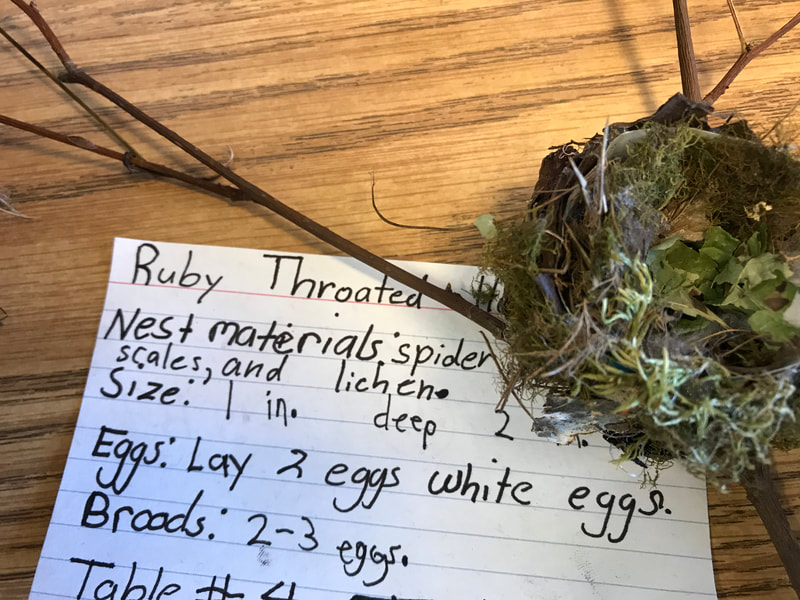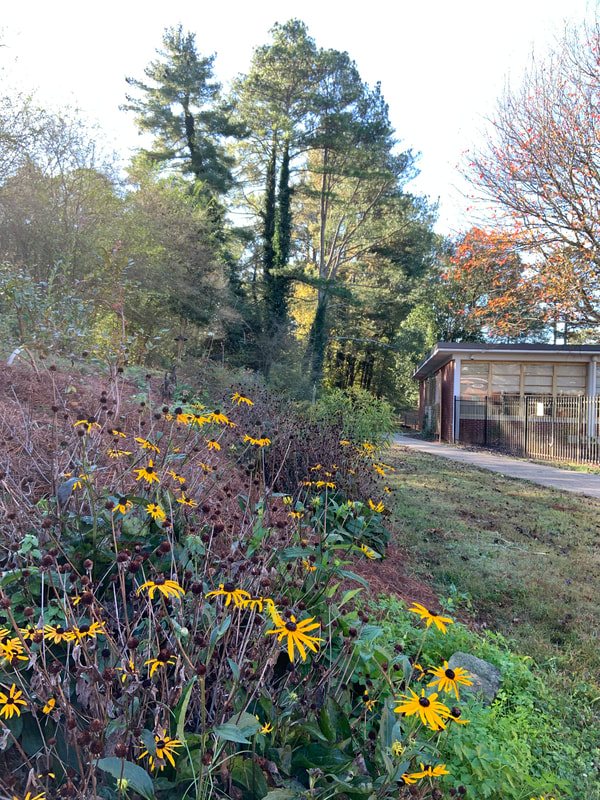|
Photos by Stephanie Spencer By Dottie Head, Director of Communications
Students at Sagamore Hills Elementary School in Atlanta, DeKalb County, have a newly certified Georgia Audubon Wildlife Sanctuary to use for outdoor learning thanks to the diligent work of Stephanie Spencer, a K-5 STEM teacher at the school. The school garden habitat is accessible to the public and students use it daily for activities ranging from studying the monarch life cycle and bird habitat requirements to conducting bird and butterfly counts. The wildlife habitat is certified by both Georgia Audubon and Monarchs Across Georgia, and the project has been several years in the making. Stephanie and another teacher, Allison Nelson, enrolled in a three-day, Georgia Audubon Taking Wing and Flying Together workshop back in June of 2019. One of the assignments was to design a native bird habitat for their school. Stephanie chose a weedy hillside near the playground for the project, and she worked with Trecia Neal, a Master Gardener and retired biologist from Fernbank Science Center, on the habitat design. Stephanie also wrote two grants to help fund the project and received plant donations. The whole school came together on the garden installation. More than 60 staff, students, and parents showed up for three Saturday workdays to clear the hillside, plant, and mulch. During an initial visit to the school by Gabe Andrle, Georgia Audubon habitat conservation manager, and Melinda Langston, Georgia Audubon board member and an active avian advocate volunteer, recommended that the area needed less turf grass and more native plants in order to qualify for certification as a Georgia Audubon Wildlife Sanctuary. They also recommended that a nearby hillside be converted to a native habitat due to its wonderful potential with a great native canopy, public-facing location, and outdoor classroom space. Stephanie went back to work, consulting with Fernbank horticulturists to map out an additional 250-foot garden along the side of the building and identify a list of native plants that would do well in this habitat. An additional work day on the Martin Luther King, Jr., Day of Service resulted in 100 volunteers planting more than 100 native shrubs and other plants and adding a 3-4” layer of mulch to all the beds. The school was officially certified as Georgia Audubon Wildlife Sanctuary in November 2020. “The garden has thrived, and the students have enjoyed seeing the monarch, Gulf fritillary, and swallowtail eggs and caterpillars on all of the host plants,’ says Spencer. “The number of birds has also increased dramatically, or maybe we’re just noticing them more!” One final addition to our campus was 22 nest boxes for seven species of birds, thanks to a generous donation from Scott Scheivelhud, a grandparent and owner of The Garden Enthusiast, in Tucker. Each grade level was assigned a species of bird to monitor, and each homeroom participated in the installation of their nesting box. In spite of the difficulties posed by the pandemic, students have continued using the garden. A grant by the Sagamore Hills Foundation allowed the school to purchase 25 pairs of student binoculars. Stephanie and Allison developed a bird unit and taught all second-grade students how to use the binoculars both on campus and at nearby Turtle Creek. “We saw a Great Blue Heron, Gray Catbirds, Red-winged Blackbirds, Eastern Bluebirds, Cardinals, chickadees, and many other birds, quite a few of which the students were able to identify,” says Spencer. In addition, students collected monarch, gulf fritillary, and swallowtail eggs to raise in the classroom. Each fall, students tag the monarchs and report tag numbers to Monarch Watch at the University of Kansas. Students also take part in the Great Pollinator Count and monitor and report data from the nest boxes using Cornell’s Nestwatch Program. “The students love being involved in citizen science projects like NestWatch, Monarch Watch, Journey North, and Project Monarch Health,” says Spencer. The first question students ask when they come to class is, ‘Are we going outside today?’ says Spencer. “The kids absolutely love being outside. They take their jobs outside seriously, whether it is looking for birds, collecting leaves, measuring the rainfall, planting vegetables or identifying invasive plants. They take their clipboards and record their data and return to enter it on national data bases or in their STEM journals. The excitement is evident through their discussions and what I hear from parents. Parents tell me they are learning things they never knew about plants, animals, stream health, pollution, and invasive species from their children. The children’s enthusiasm is contagious, and they get their parents involved. They even involve the community by collecting seeds from our native plants and sharing them with the neighborhood in our seed library.” When asked what she recommends for parents and other teachers who want to get started with more engaging outdoor learning, Stephanie recommends getting outside and enjoying all the parks in Georgia. She also recommends taking advantage of the programs offered by Georgia Audubon, the Chattahoochee Nature Center, and local parks, as well as the many outdoor education programs such as Project Learning Tree, Georgia Audubon’s Taking Wing and Flying Together, Project WET, Adopt a Stream, and Captain Planet. “I have been a member of Georgia Audubon and the Environmental Education Alliance of Georgia for years,” says Spencer. Through these organizations I have met a lot of amazing scientists and environmental educators who have inspired me and/or helped me plan our outdoor spaces, provide programs for my students and provide a wide range of training for teachers. Networking with outdoor educators has had a big impact on me and how I teach my students. They have given me the information, encouragement and motivation necessary to plan the expansions to our outdoor spaces at Sagamore Hills.” Georgia Audubon is thrilled to add Sagamore Hills Elementary School to the list of more than 600 certified Wildlife Sanctuaries in Georgia. “Stephanie deserves a lot of credit for this amazing wildlife habitat,” says Andrle. “The school has really embraced birds and pollinators and tied them into curriculum in many meaningful ways.” Resources: Georgia Audubon Wildlife Sanctuary Program - https://www.georgiaaudubon.org/wildlife-sanctuary-program.html Georgia Audubon Taking Wing and Flying Together - https://www.georgiaaudubon.org/professional-development.html Cornell Nestwatch - https://nestwatch.org/ Monarchs Across Georgia - https://www.eealliance.org/monarchs-across-ga.html Monarch Watch - https://www.monarchwatch.org/ Monarch Waystation Certification - https://www.monarchwatch.org/waystations/certify.html
2 Comments
Shannon McGinty Spillett
5/28/2021 08:41:43 am
Love it!!!
Reply
Susan Lindsey
5/28/2021 11:09:46 am
This is incredible! Thank you Ms Spencer for all your hard work - in teaching our kids and for Sagamore!
Reply
Your comment will be posted after it is approved.
Leave a Reply. |
AuthorBirds Georgia is building places where birds and people thrive. Archives
July 2024
Categories |



 RSS Feed
RSS Feed

